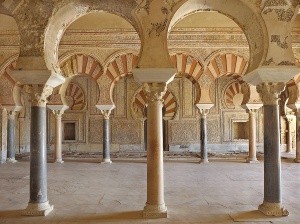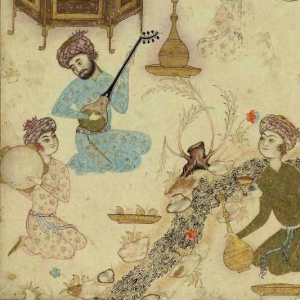(Boylove Documentary Sourcebook) - A List of Some Handsome Beardless Youths of Early 12th-Century Al-Andalus in a Poem by Ibn Quzmān

From The Mischievous Muse: Extant Poetry and Prose by Ibn Quzmān of Córdoba (d. AH 555/AD 1160), Volume 1, edition, translation, and notes, along with an analysis of selected poems by James T. Monroe, Brill Studies in Middle Eastern Literatures (Leiden, Netherlands: Brill, 2016). Footnotes omitted.
Note: The zajal below comes from the Dīwān (Early 12th Century) by Abū Bakr ʿAbd al-Malik ibn Quzmān, which is dedicated to his patron, the amīn ("Market Inspector of Weight and Measures") Abū Iṣhāq Ibrāhīm ibn Aḥmad al-Waškī.[1]
69
0 The love of my heart requests
That I praise pretty boys.
1 I will have to praise those
About whom he has had good things to say:
I would never contradict Al-Waškī’s opinion
Even though surrounded by lances.
2 Indeed, his nature has no equal,
For he is always responsive to me:
In this wise does a helpful nature
Respond, as soon as it is called.
3 I apologize to you, Sir,
For beginning with whomever I may;
I’m neither putting a good boy after a bad one,
Nor putting him first because of his goodness.
4 As-Subkī’s youngest son
Has a face like the shining full moon;
Once he grows up he’ll be even prettier,
For midday comes after dawn.
5 The same is true of Ibn al-Aslamī:
Whoever denies his beauty is blind,
And is defending himself with a lie,
So that I grant my permission to attack him.
6 The son of ḥajj Ibn Ubayy
Is well-mannered, intelligent, and sweet:
“There is no beauty beyond his!”
Loudly announces the one who sees him.
7 As for Ibn Muḥriz, what a boy he is!
There’s no one like him anywhere.
Should anyone fall ill for lack of him,
He will recover upon seeing that lad’s eyes.
8 The same is true of Ibn Abī l-Ḫiṣāl:
Beauty itself becomes confused by his beauty:
He was created from permitted magic,
So speak out in praise of him, without any sin.
9 Likewise, Al-ʿAbbād has certain qualities,
And is perfect in every respect:
Sitting down without loving him is a sin,
Whereas dying of love for him is a virtue.
10 Likewise, Ibn al-ʿAṭṭār is cute,
And love for him is true love:
Were Qays ibn aḏ-Ḏarīḥ to see him,
He would find no escape from the boy.
11 In beauty, the tax-collector’s son
Is so outstanding that he has no equal:
You will find eyes like a gazelle in him,
Along with little cheeks like dawn.
12 His brother Aḥmad encompasses [fair features],
For elegance is natural to both of them:
Whoever falls into his snare, will collapse
And remain in it with broken wings.
13 As for Abū Bakr of Cúllar-Vega,
What a cute boy he is, both rare and noble!
Because of his prettiness, wounds
Are inflicted upon men’s hearts.
14 Likewise, Al-ʿIzz has no equal;
Every form of beauty’s reached its peak in him:
If he swaggers, he has every right to do so,
And is to be thanked for his condescension.
15 As for that boy’s maternal cousin,
It is also my purpose to praise him,
For, by the Prophet, I know well
That I seduce with my praise.
16 Who’s the boy from Priego I’ve not seen,
When God Himself brought him to us?
I will now fly in praise of him,
As does the falcon on wings.
17 Abū l-Qāsim, I have finished
Mentioning all those included in my zajal;
It is sound, with smooth wording,
And even sounder ideas.
18 What words they are, extended and sweet,
Of equal quality from first to last!
If not for you, I’d never have composed them,
And now, who would ever consider marriage?

References
- ↑ James T. Monroe, ed. and trans., The Mischievous Muse: Extant Poetry and Prose by Ibn Quzmān of Córdoba (d. AH 555/AD 1160), Volume 1, Brill Studies in Middle Eastern Literatures (Leiden, Netherlands: Brill, 2016), p. 24.